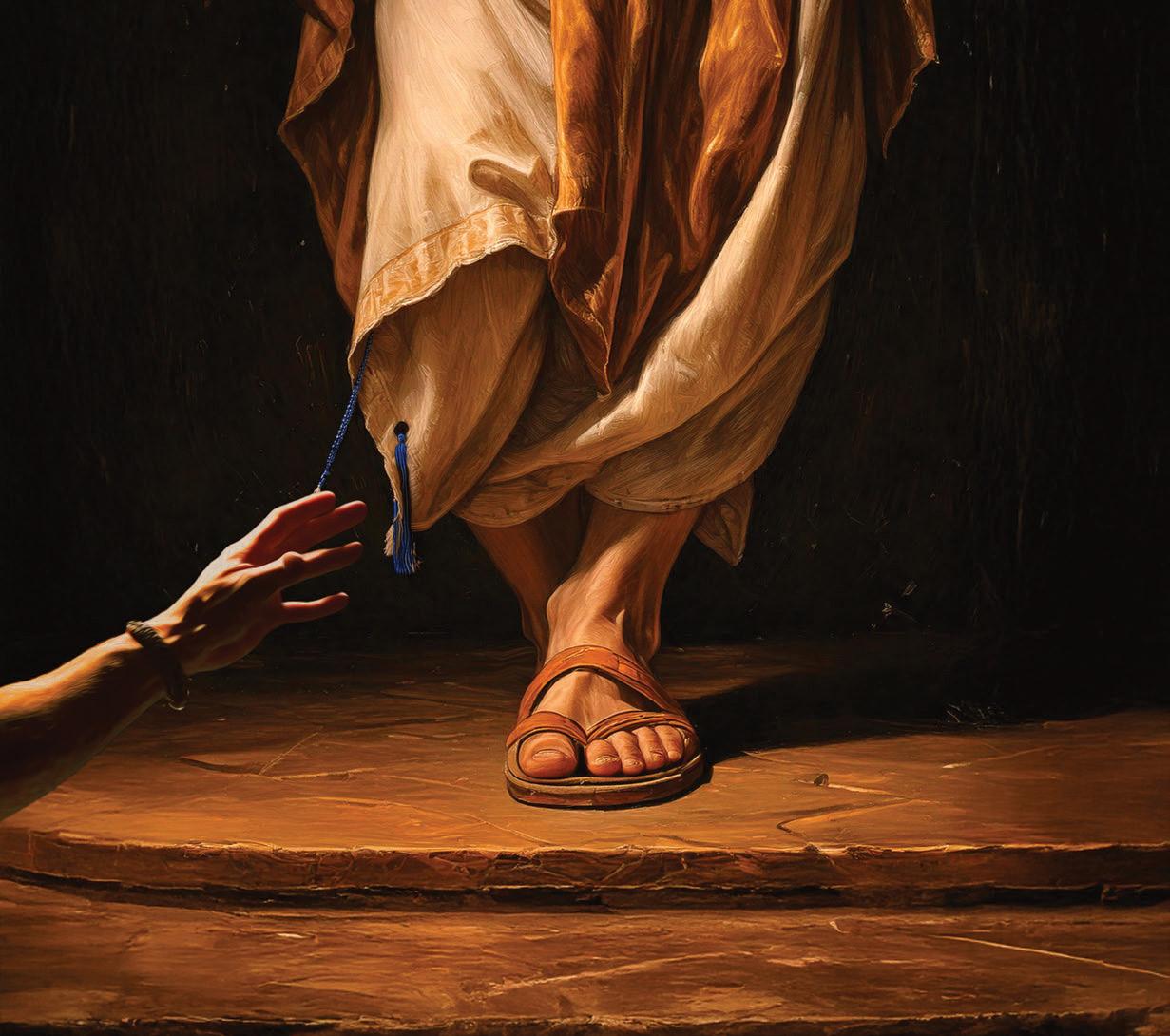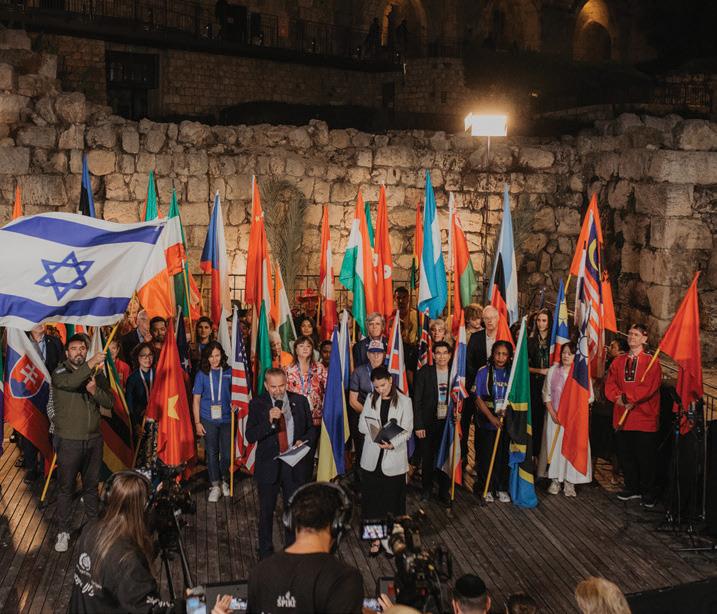
1700 YEARS AFTER NICAEA (PAGE 4)


1700 YEARS AFTER NICAEA (PAGE 4)
Israel Advocacy Day 2025 Unites 300 Faith Leaders on Capitol Hill
International Christian Embassy Jerusalem
The International Christian Embassy Jerusalem was established in1980 in recognition of the biblical significance of all of Jerusalem and its unique connection to the Jewish people. Today the ICEJ represents millions of Christians, churches, and denominations to the nation and people of Israel. We recognize in the restoration of Israel the faithfulness of God to keep His ancient covenant with the Jewish people. Our main objectives are:
• To stand with Israel in support and friendship
• To equip and teach the worldwide church regarding God’s purposes with Israel and the nations of the Middle East
• To be an active voice of reconciliation between Jews, Christians, and Arabs, and to support the churches and congregations in the Holy Land
From its head offices in Jerusalem, the ICEJ reaches out into more than 170 countries worldwide, with branch offices in over 90 nations.
Our vision is:
• To reach every segment of Israel’s society with a Christian testimony of comfort and love
• To reach and actively represent to Israel the support of denominations, churches, and believers from every nation on Earth
The Christian Embassy is a non-denominational faith-based ministry supported by the voluntary contributions of our partners and friends across the globe. We invite you to join with us as we minister to Israel and the Jewish people worldwide by donating to the ongoing work and witness of the ICEJ.

Dear Friends,
As Israel continues to face enemies on many fronts—including Gaza, Judea and Samaria, Lebanon, Syria, Yemen, Iraq, and Iran—the ICEJ remains steadfast in our commitment to support the nation God set apart to bring glory to His name.
We are actively closing critical security gaps in the north by placing bomb shelters where they are needed most. We are walking alongside young Israeli adults facing an uncertain future, offering them guidance and tangible support. We are partnering with a women’s center that brings healing and dignity to some of the most vulnerable women in Israeli society. And we are investing in the future through technology and computer training programs that serve Jewish and Arab children and youth at risk, job seekers, individuals with disabilities, and the elderly.
These projects reflect our deep love for Israel and dedication to practical, compassionate action. I invite you to read more about each of these vital initiatives in the pages ahead—you will be inspired and encouraged!
Our message to Israel remains simple and unwavering: “Behold your God!” (Isaiah 40:9). Over the past two years, Israel has endured profound tragedy and undeniable miracles. Miracles testified by soldiers. Miracles witnessed by everyday people in the streets. Even miracles carried back from the darkness by hostages who were freed. God is moving in Israel in ways we have never seen before.
ICEJ President Dr. Juergen Buehler
USA President Susan Michael
VP International Affairs Dr. Mojmir Kallus
VP Finance David van der Walt
USA Director of Finance Barry R. Denison
Senior VP & International Spokesman David Parsons
VP AID & Aliyah Nicole Yoder
Managing Editor/Publications Director Laurina Driesse
USA Managing Editor Karen Engle
Staff Writer Anastasiya Gooding
Graphic Design/Illustrators Ryan Tsuen, Nancy Schimp
Photography Adobe Stock, Adobe Firefly, Shutterstock, AP, Flash90, JAFI, Dorron Kline-Telfed, iStock, JAFI, Annie Splatt on UnSplash, Operation Lifeshield,Wikimedia, Wordpress, Teresa Craig, Jonathan Williams, ICEJ Staff and Branches
The New King James Bible is used for all Bible references unless otherwise noted.
Word From Jerusalem is published by the International Christian Embassy Jerusalem. Reproduction in whole or in part without written permission is prohibited. Word From Jerusalem has no subscription price and is supported through contributions worldwide. The ICEJ USA Branch is a 501(c)(3) non-profit organization with offices in Tennessee, Florida, and Washington, DC. All gifts to this ministry are tax-deductible according to United States law.
And gentiles have a part to play. This issue of Word From Jerusalem features an article by ICEJ’s David Parsons about how Zechariah’s prophetic visions saw gentiles worshiping in Jerusalem—a powerful sign for our times. Considering this, I warmly invite you to join us for the Feast of Tabernacles 2025 this October 6–13. Let us gather in Jerusalem to show our love, solidarity, and unshakable support for the people of Israel. This prophetic celebration will see believers from every nation, every language, and every city—at least ten righteous among them—ascending to Zion to seek the Lord during Sukkot. Learn more at: www.icejusa.org/feast-tour.
Many blessings—and thank you for standing so faithfully with Israel.

Dr. Juergen Buehler ICEJ President
COVER PHOTO: In early May, more than 300 pastors, rabbis, and faith leaders united on Capitol Hill for the 2025 Israel Advocacy Day, forging a powerful alliance to strengthen pro-Israel support in Congress. The event was spearheaded by American Christian Leaders for Israel (ACLI), a project of the International Christian Embassy Jerusalem (ICEJ) USA Branch. (Jonathan Williams | NationalPhotography.us)
FOR MAGAZINE ARCHIVES visit www.icejusa.org/wfj

FEATURED TEACHING
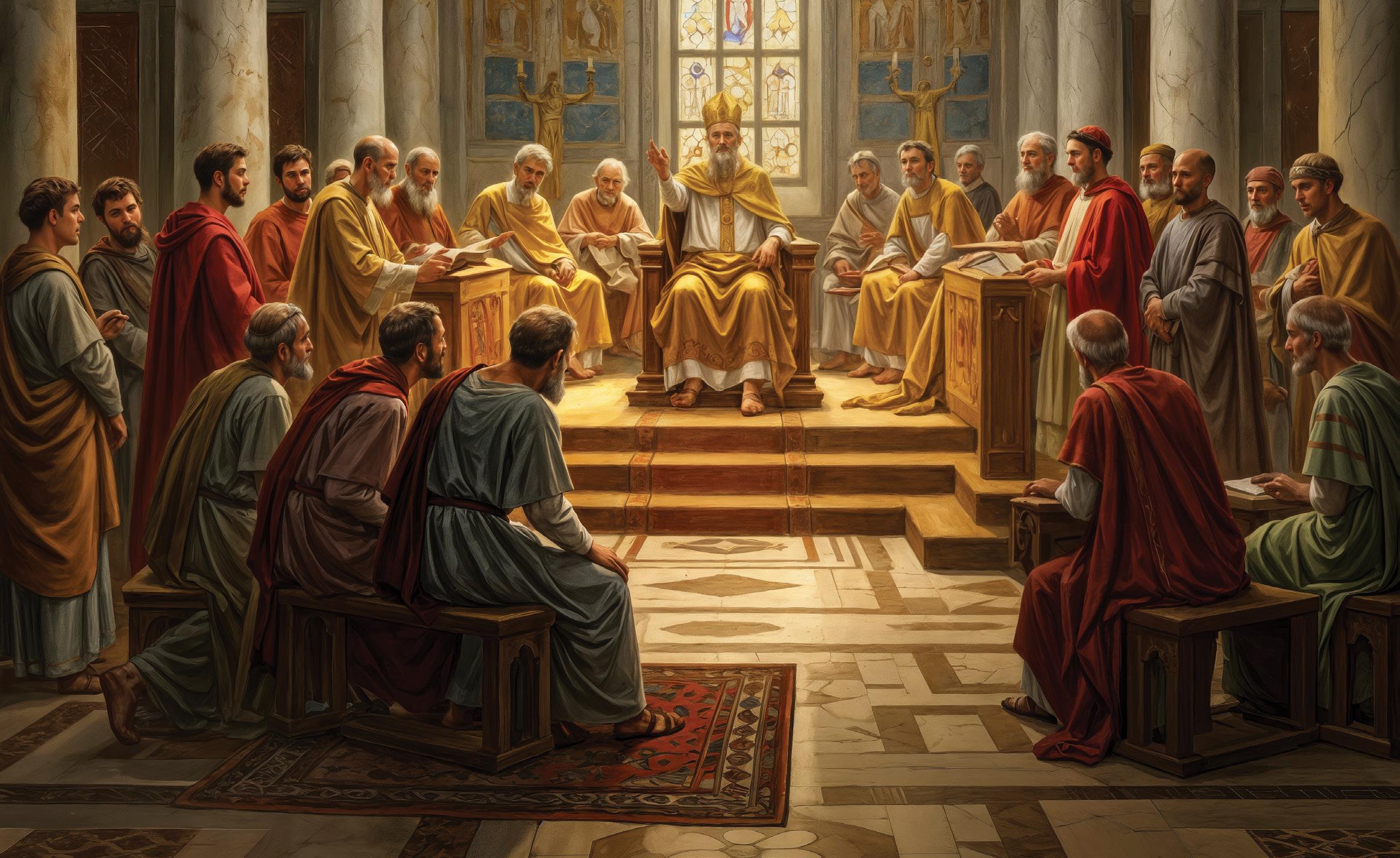
4
1700 YEARS AFTER NICAEA

8 GOD SEEKS A “RIGHTEOUS REMNANT” FROM EVERY NATION

ICEJ BOMB SHELTERS CLOSING SECURITY GAP FOR ISRAEL’S NORTH
10 JEWS AND CHRISTIANS STAND FOR ISRAEL ON CAPTIOL HILL

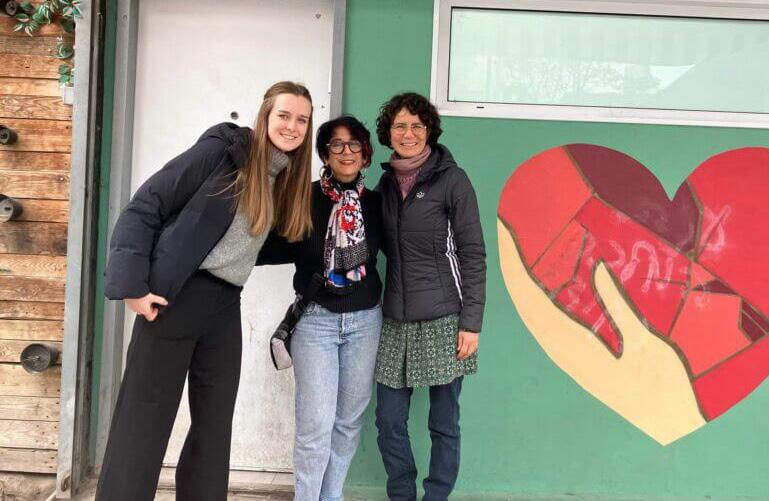
16
ROLLING OUT THE RED CARPET FOR DEJECTED ISRAELI WOMEN
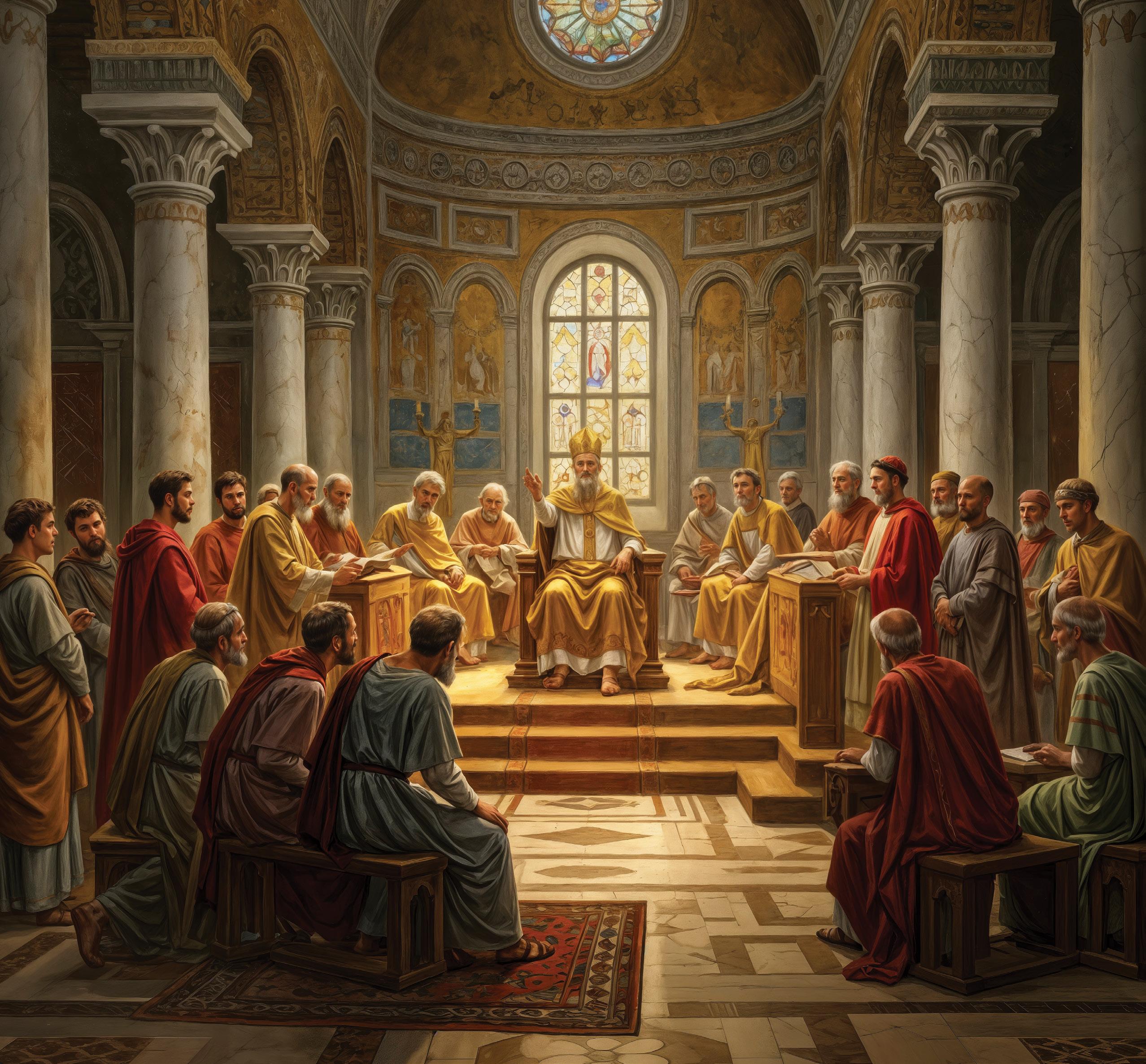
A special call to 100 days of prayer and fasting to heal the rift between the church and the Jewish people
BY DR. JUERGEN BUEHLER, ICEJ PRESIDENT
The Council of Nicaea in AD 325 discusses Christendom (AI-Generated Illustration)
This year many churches around the world are commemorating 1700 years since the landmark Council of Nicaea in AD 325. According to church historian Philip Schaff, Nicaea was—next to the Apostolic Council in Jerusalem in Acts chapter 15—“the most important and the most illustrious of all the councils of Christendom.1
Nicaea was only the second global council since the days of the original apostles. In Acts 15, we read about the very first church council discussing how to deal with
the new phenomena of gentiles joining a predominantly Jewish church. In that Jerusalem gathering, the early apostles had opened wide the door for gentile believers to join the church.
The umbilical cord was cut between the church and Israel, even though it was the nation and people who had birthed the church.
Nicaea impacted the church in a similarly powerful way. But unlike the Jerusalem Council, at Nicaea, the doors of the church began to be firmly close on the Jewish people. The umbilical cord was cut between the church and Israel, even though it was the nation and people who had birthed the church. It also opened the door for growing anti-Jewish tendencies among gentile Christians in the centuries that followed.
To be clear, this development was neither planned nor intended when the council
was first called. Yet what made Nicaea end with a very different result from its inception was not inspired by spiritual leaders as in Acts 15 but by the Roman emperor himself.
Emperor Constantine, who reigned from AD 306 to 337, was a new convert to Christianity. This brought a tremendous sense of relief for the early church, which had just survived one of the worst waves of persecution a few years earlier under Emperor Diocletian. Constantine not only eased the fears of the church but decided to make his newly found faith the most official religion of the Roman Empire.
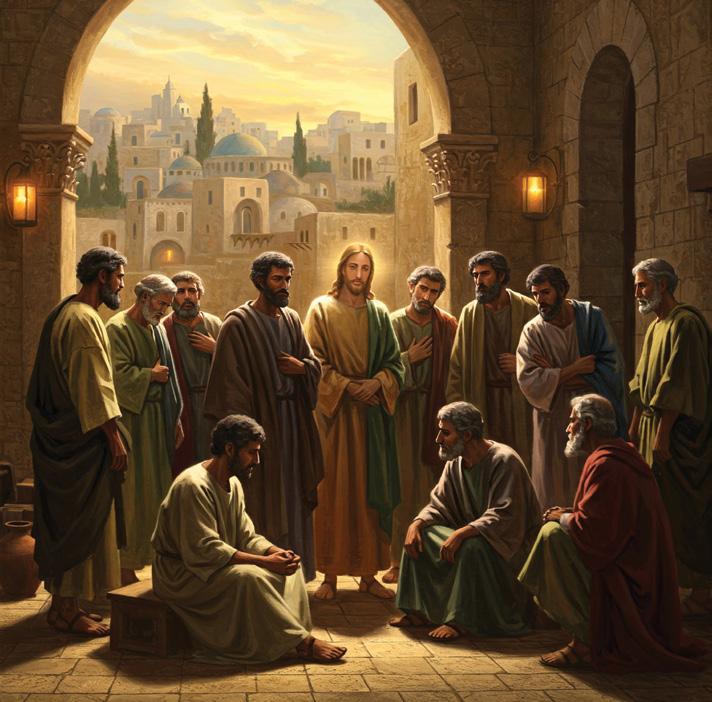
But Constantine quickly found out that Christianity was not a unified, harmonious group of people. It had many factions and theological views across the empire. One of the greatest challenges was the wide diversity of views on the person of Jesus Christ. Was He fully divine or a mere man?
One of the main challengers to Christ’s divine nature was Arius, a priest from Alexandria. He taught that Christ was a created being, was not fully divine, and did not share the same substance as God. While he was excommunicated from the church, his teaching spread through many churches, mainly in the east, and caused significant disunity later referred to as the Arian controversy. Other key questions also arose, such as if backsliders who had compromised their faith during a time of persecution should be welcomed back in the church.
Up to the Council of Nicaea, most churches still celebrated Easter in relation to the Jewish festival of Passover.
However, one matter that unsettled Constantine was the lack of a unified holiday calendar for the church.2 Until then, many different traditions existed on when to celebrate Christ’s death and resurrection, and to ensure that Christianity would serve the entire empire, he wanted to establish a unified calendar.
Up to that point, most churches still celebrated Easter in relation to the Jewish festival of Passover. Many churches celebrated it on the first Sunday after the fourteenth day of the Hebrew month of Nisan, aligning with the biblical feast of Firstfruits during Pesach (Leviticus 23:11). Others fixed it on Nisan 14 itself, and they became known as the Quartodecimans (Latin for 14). Still others insisted any Sunday in Nisan would do. Then there were those who separated Easter from the biblical calendar altogether and affixed it to the first Sunday after the spring equinox. For a new state religion, Constantine found this all too confusing.
To solve these issues, Constantine called for a global council. At Nicaea (today known as Iznik, just south of Istanbul), he wanted to settle these matters once and for all.
After months of deliberation, the divine nature of Jesus was affirmed in what became known as the Nicaean Creed. This doctrinal statement on the triune Godhead still serves as the core confession of faith for most churches around the world today, and thus it became a key unifying source for the Christian faith over the past 1,700 years. This important outcome of Nicaea cannot be understated! In addition, those believers who hid from persecution were welcomed back into the church. Finally, the Nicaean Council also wrestled with the lack of a unified church calendar.

Of course, all this was not a quick, easy process. It took close to 300 Bishops from May 20 until August 24 to decide these matters, with the last weeks left to determine an agreed date for Easter. That
date was finally determined based on the principles that Easter should always be on a Sunday, it should not be celebrated twice in one year, it should follow the spring equinox, and it should never be celebrated at the same time as the Feast of the Jews (Passover).3
When the council was over, the closing letters were sent from the emperor himself to churches around the world. But his summary revealed that possibly the biggest issue for Constantine was not just reaching a set date for Easter but the fact that Christians relied on Jewish input to celebrate the most important Christian festival.


Constantine wrote to the churches: “It was declared to be particularly unworthy for this, the holiest of all festivals, to follow the custom [the calculation] of the Jews, who had soiled their hands with the most fearful of crimes, and whose minds were blinded.” In the same letter he called it a duty of the church “to separate ourselves from the detestable company of the Jews” and “not to have anything in common with the murderers of our Lord.”4
While the creed and the twenty canons that emerged from Nicaea were free of anti-Jewish rhetoric, the official letters from Emperor Constantine contained a critical and condescending attitude toward the Jews. Nicaea then became the goldstandard for future councils, setting the tone for centuries to come. Just a few decades after Nicaea, one of the most revered church fathers, Chrysostom of Alexandria, lashed out against the Jews by comparing them to beasts “that are fit for slaughter,” adding that by killing Jesus they have “no chance for atonement, excuse, or defense.”5
Paul’s Doctrine on Israel
This is even more startling when we consider that the apostle Paul could not have been more clear in his teachings about the unique, enduring calling of Israel, to whom “pertain the adoption, the glory, the covenants, the giving of the law, the service of God, and the promises” and of whom “are the fathers” and from whom, according to the flesh, Christ came, who is over all, the eternally blessed God” (Romans 9:4–5).
Paul recognized that while most Jews had failed to accept Yeshua as their Messiah,
“For if the Gentiles have come to share in their [the Jews] spiritual blessings, they ought also to be of service to them in material blessings.”
- ROMANS 15:27 (ESV) -

they nevertheless remain “beloved for the sake of the fathers” (Romans 11:28).
Paul saw their rejection of Jesus as only a temporary state that the Hebrew prophets foretold (for example, Isaiah 6). Yet he also believed the time would eventually come when “all Israel will be saved” (Romans 11:26).
He thus admonished gentile believers not to be arrogant against the Jews (Romans 11:18) and to consider their own origins, when they were “separated from Christ, alienated from the commonwealth of Israel and strangers to the covenants of promise, having no hope and without God
in the world” (Ephesians 2:12). Yet now by grace, they have been brought near and share in God’s promises to Israel.
This was not just theology; it had practical consequences for the church. To the church in Corinth, Paul wrote that every week something should be set aside as an offering for the saints in Jerusalem (1 Corinthians 16:1–4; see also 2 Corinthians 9:5). Wherever Paul went, he made sure that new congregations were instructed to support the Jewish believers in Jerusalem. The reason for that was straightforward: “For if the Gentiles have come to share in their [the Jews] spiritual blessings, they ought also to be of service to them in material blessings” (Romans 15:27).
Paul also warned gentile believers in the church at Rome not to become arrogant toward the Jews (Romans 11:20), while the Third Epistle of John indicates that Jewish believers were no longer being welcomed in certain churches.
Celebrating Jewish feasts and keeping Shabbat, according to the bishops, was like “mocking Christ.”
Several Christians struggled to agree. But the follow-up Synod of Laodicea settled the matter. Christians who kept the Jewish Sabbath were considered “Judaizers.”
The apostle Paul (AI-Generated Illustration)

Until the Council of Nicaea in AD 325, the churches were divided on how to celebrate Easter (Passover), and Sunday was never considered a holy day. While most churches still relied on the book of Exodus as to how to fix Easter, after Nicaea, any link to the biblical account of Passover was forbidden. Constantine demanded a unified Christian calendar for his empire that had nothing to do with Jewish tradition, while he totally disregarded the multiple parallels of the last days of Jesus Christ to the biblical Passover feast and that Paul referred to Jesus as our Passover lamb (1 Corinthians 5:7). All of this was ignored.

In the same manner, a new weekly holiday was established: Sunday. Until then, Sunday was not observed as a holy day at all, save for some Christians who held a time of prayer and Scripture readings on Sunday mornings before going to work, remembering that the Lord rose on the first day of the week. But Constantine’s aim was to separate the church completely from any Jewish customs. So to keep Christians from observing Shabbat (Sabbath), he invented the new holy day of Sunday.
Further, Paul’s question, “What advantage has the Jew?” was no longer answered “Much in every way!” but with an opposite spirit of rejection. Instead of Jews being “beloved for the sake of the fathers” (Romans 11:28), they were now the “murderers of Christ.” In various council records, the list of the damned included “heretics, heathens, and Jews.”6 After Nicaea, bishops asked Jewish converts to give up their Jewish names and adopt Christian ones.7 In Paul’s world, it was gentiles who were without God and without hope (Ephesians 2:12), but now this applied to the Jews—a doctrine that ran contrary to New Testament thought.
All this led to strict laws that forbade any positive engagement with Jews. Nicaea and subsequent church councils taught that Christians should have nothing to do with Jews. Leaders who visited and prayed in synagogues were to be removed from office, and ordinary Christians who did so should be “put off.”8 The synod of Trullo forbade any participation in their feasts, nor were
Christians to take their unleavened bread during Passover. You could not even allow a Jewish physician to treat your illness, one synod ruled. Celebrating Jewish feasts and keeping Shabbat, according to the bishops, was like “mocking Christ.”9
This entirely new approach of contempt for the Jews not only created a rift between the church and the Jewish people, but it also set the church on a path that eventually led to the atrocities of the Crusades, where the killing of Jews was considered pleasing to God. It later paved the way for the many inquisitions, expulsions, pogroms, and eventually the Holocaust, when Hitler could quote the German reformer Luther to justify his hatred of the Jews.

What was so tragic about Nicaea is that it was only the second universal council of the church. Whereas in Acts 15, the Jewishled church went beyond their traditions to welcome and embrace gentile believers, the gentile church after Nicaea shamelessly rejected the Jews from all church life and began fueling Christian antisemitism for generations to come.
Today, 1700 years after Nicaea, we sense a need to invite believers from around the world to join us in prayer and fasting for this tragic history. First, we want to thank God for all the good results and blessings that came out of Nicaea, which protected the church from many grave errors. Nicaea birthed an inspired, unifying creed that is still a great blessing to this day.
Yet, we also want to invite you to join us for the 100 days from May 18 to August 24 (roughly the anniversary dates for Nicaean council) to pray and fast concerning the unfortunate damage to Jewish-Christian relations that arose from Nicaea. Of course, you would not be asked to fast the entire time but simply choose certain days and times when you can fast and pray on these matters.
We also plan on setting aside one day each week on the ICEJ’s daily Global Prayer Gathering online to pray into the various
Monday Mornings • May 18 to August 24
During this season, we invite you to give thanks for the good fruit of Nicaea while also interceding for the healing of the historic wounds it caused with the Jewish people. We are not asking you to fast for the entire period but to choose days when you can stand in the gap through prayer and fasting. Every Monday during this timeframe, our Global Prayer Gathering will feature noted Christian scholars providing information and insights into Nicaea to help guide our prayers. We will focus on the themes of repentance, remembrance, reconciliation, and restoration, trusting that God will bring fresh revival and healing.
LEARN MORE AT: www.icejusa.org/event-item-global-prayer-gathering
outcomes of the Nicaean Council—both positive and negative. May this prayer effort bring revival in our churches, as well as repentance, remembrance, reconciliation, and restoration.
Like Daniel, we come in repentance for the sins of our forefathers. We ask for forgiveness for the ways the church has failed and sinned against the very people who gave us the Messiah and the Word of God.
Every week we will spend time learning more about Nicaea, to understand and remember the time when much went right, but also wrong regarding the Jewish people.
We pray that God will continue to grant reconciliation between Christians and Jews, as has been occurring over the past 100 years, and more Christian support for Israel’s return.
We pray that, according to Malachi 4:6, our God will turn the hearts of the fathers (the Jewish people) to the children (the gentile church), and the hearts of the children (the gentile church) to the fathers (the Jewish people).
NOTES:
1. Schaff, P., & Schaff, D. S. (1910). History of the Christian Church (Vol. 3, p. 630). Charles Scribner’s Sons.
2. Encyclopedia of Ancient Christianity, InterVarsity Press.
3. Hefele, C. J. (1871). A History of the Councils of the Church (W. R. Clark, Trans.; Vol. 1, p. 325). T&T Clark.
4. Schaff, P., & Wace, H., eds. (1900). “On the Keeping of Easter.” In H. R. Percival (Trans.), The Seven Ecumenical Councils (Vol. 14, p. 54). Charles Scribner’s Sons.
5. Chrysostom, John. Eight Homilies Against the Jews (p. 93). (Function). Kindle Edition.
6. Schaff, P., & Wace, H., eds. (1900). “The XXX Canons of the Holy and Fourth Synods, of Chalcedon.” In H. R. Percival (Trans.), The Seven Ecumenical Councils (Vol. 14, p. 278). Charles Scribner’s Sons.
7. Percival, H. R. (1900). The Canons of the 318 Holy Fathers Assembled in the City of Nice, in Bithynia. In P. Schaff & H. Wace (Eds.), The Seven Ecumenical Councils (Vol. 14, p. 32+504). Charles Scribner’s Sons.
8. Schaff, P., & Wace, H., eds. (1900). “The Apostolical Canons.” In H. R. Percival (Trans.), The Seven Ecumenical Councils (Vol. 14, p. 598). Charles Scribner’s Sons.
9. Schaff, P., & Wace, H., eds. (1900). “The Canons of the Council in Trullo.” In H. R. Percival (Trans.), The Seven Ecumenical Councils (Vol. 14, p. 370). Charles Scribner’s Sons.
BY DAVID R. PARSONS, ICEJ SENIOR VICE PRESIDENT & SPOKESMAN
This year’s Feast theme, “Ten from Every Nation,” comes from the prophetic visions of Zechariah. He had been assigned a difficult task. The Persian emperor Cyrus had died, and with him expired the royal decree allowing the Jews to rebuild their temple in Jerusalem, as well as his funding. The local Samaritans also opposed the work. Finally, many old-timers had seen or heard about the glory of Solomon’s Temple and insisted this house fell far short of its splendor.
Yet the Hebrew prophets took a different view. Haggai declared “the glory of this latter temple shall be greater than the former” (Haggai 2:9).
Zechariah also proclaimed: “The hands of Zerubbabel have laid the foundation of this temple; his hands shall also finish it. . . . Who has despised the days of small things?” (Zechariah 4:9–10).
Zechariah saw this restored temple drawing not only Jewish pilgrims but also many God-fearing gentiles. In fact, he foresaw a day when all the nations would come up to Jerusalem every year “to worship the King, the Lord of Hosts, and to keep the Feast of Tabernacles” (Zechariah 14:16). This prophetic vision is what inspired those pioneers who launched the first public Christian celebration of the Feast of Tabernacles for gentile believers in 1980, which quickly grew into the largest annual tourist event in Israel.
Zechariah 8 expands on this prophetic vision in a powerful way. The passage first makes clear that God is “zealous for Zion . . . with great fervor”—meaning the city of Jerusalem and the temple (Zechariah 8:1). He vows to bring the Jewish people back to dwell safely in the city (vv. 7–8). The Lord also promises to prosper and bless them, for He is “determined to do good to Jerusalem and to the house of Judah” (vv. 11–15)
Equally remarkable, Zechariah foresaw multitudes of gentiles also ascending to Jerusalem to worship the Lord. People from one city would urge those from other cities “to go and pray before the Lord, and seek the Lord of hosts . . . Yes, many peoples and strong nations shall come to seek the Lord of hosts in Jerusalem, and to pray before the Lord. In those days ten men from every language of the nations shall grasp the sleeve of a Jewish man, saying, ‘Let us go with you, for we have heard that God is with you’” (Zechariah 8:20–23).
This is an extraordinary vision that stands in stark contrast to the prevailing circumstances of the time. Only a small remnant of Jews had returned to a city and temple in ruins, and the task of rebuilding them appeared monumental, let alone transforming them into something more glorious than before. However, the word of the Lord assured that the temple would indeed be rebuilt, and it would surpass even the glory of Solomon’s Temple. The scattered Jewish people would also be regathered and rebuild their nation into a prosperous and peaceful kingdom. Furthermore, gentiles would be drawn to Jerusalem like never before, coming to make pilgrimage alongside the Jews and to worship the Lord during the feasts of Israel.

This had happened in small measure during the time of Solomon’s Temple, but Zechariah saw it extending to all peoples, with a righteous remnant of at least “ten from every language of the nations” grabbing hold of the Jews and ascending to Jerusalem to worship and serve their God.
This is an incredible prophetic vision not only from the perspective of the days of Zechariah but also from the broader perspective of redemptive history. The truth is that God had once abandoned the gentiles to worshipping other gods and preserved Israel alone as His own inheritance.
The flags of the nations are raised at the Roll Call of the Nations night at the Feast of Tabernacles 2018.
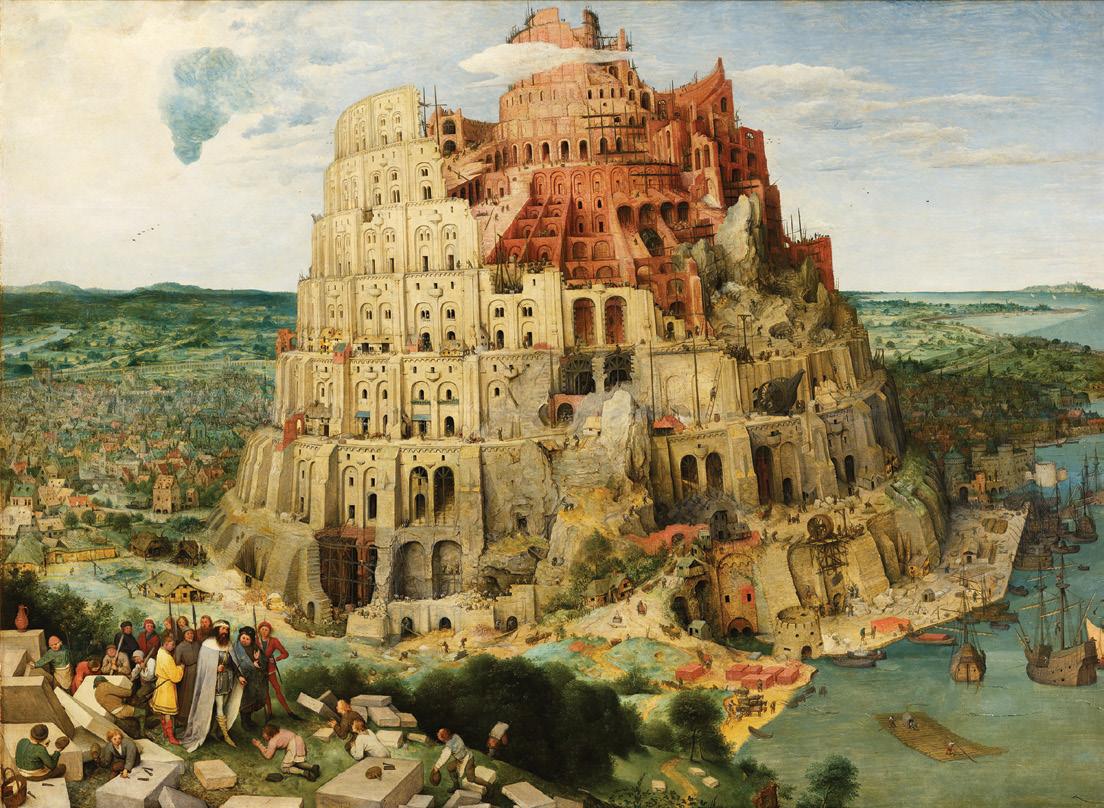
The Jewish concept of a minyan of at least 10 righteous men required to offer communal prayer comes from Genesis 19, when Abraham pleaded with the Lord to spare Sodom from destruction if He could find 10 righteous men there. But we must go back to Genesis 11 and the Tower of Babel to begin to understand the spiritual journey and destiny of the gentile nations as a whole.
It is clear from the story that the builders of Babel became extremely proud and united in their determination to build a city and make a name for themselves. Yet other peoples and generations have been similarly arrogant toward God. What was it about their decision that so angered the Lord that He came down to confuse their languages and scatter them? It was because they refused to follow His command to Noah and his family to “be fruitful and multiply, and fill the earth” (Genesis 9:1). In fact, the builders of Babel set about to build a city, “lest we be scattered abroad over the face of the whole earth” (Genesis 11:4).

Later, we learn from Moses there was something even more consequential occurring at this moment. “When the Most High divided their inheritance to the nations, when He separated the sons of Adam, He set the boundaries of the peoples according to the number of the children of Israel. For the Lord’s portion is His people; Jacob is the place of His inheritance” (Deuteronomy 32:8–9).
Here, the original Hebrew preserved in the Septuagint, an ancient Greek translation of the Old Testament, says that God divided the nations according to the bnei Elohim, or “sons of God”—meaning certain angelic beings who sit in the heavenly council (see e.g., Job 1:6; 2:1; Psalm 82:1).
Deuteronomy 4 sheds further light on the divine judgment at Babel. Here, Moses warned his people against worshipping false gods like the gentile nations, saying: “And take heed, lest you lift your eyes to heaven, and when you see the sun, the moon, and the stars,
all the host of heaven, you feel driven to worship them and serve them, which the Lord your God has given to all the peoples under the whole heaven as a heritage. But the Lord has taken you and brought you out of the iron furnace, out of Egypt, to be His people, an inheritance, as you are this day” (Deuteronomy 4:19–20).
According to such noted Bible scholars as Michael Heiser and Gerald McDermott, these passages are speaking of the Tower of Babel, when God disinherited the nations. Each nation that arose from the 70 sons of Noah was assigned a god or angelic being that would become a spiritual principality or power over them—a unique aspect of biblical cosmology affirmed in the New Testament (see e.g., Romans 8:38; Ephesians 6:12; Colossians 1:16).
Meanwhile, God retained Israel as His own special inheritance, for “the Lord’s portion is His people; Jacob is the place of His inheritance” (Deuteronomy 32:9). They were to be “a special treasure to Me above all people.” (Exodus 19:5; Deuteronomy 7:6; Psalm 135:4). And the archangel Michael was assigned as their guardian (Daniel 12:1; Jude 1:9).
Not long after Babel, God called Israel into being through the calling of Abraham and gave them the special task of bringing salvation to the entire world. This calling was contained in the divine promise that “in you all the families of the earth shall be blessed” (Genesis 12:3). The apostle Paul later describes this as the first preaching of the gospel (Galatians 3:8).
How remarkable then is God’s salvation plan! He disowned the nations at Babel but determined before the worlds were made that He—through Israel—would redeem for Himself a righteous remnant from among every nation, tongue, and tribe on earth (Revelation 5:9).
Zechariah spoke forth this plan as well, even in a time of many obstacles and frustrations for Israel, when he said that one day God would draw unto Himself at least 10 men—that is, a righteous remnant—from among every language of the nations. This remnant would grab hold of a Jew and make pilgrimage to Jerusalem because they know this is where God placed His name, where He can be found in prayer and worship, and where the promised redemption took place on the cross!
How amazing the grace of God! As gentiles, we were “aliens from the commonwealth of Israel . . . having no hope and without God in the world. But now in Christ Jesus you who once were far off have been brought near by the blood of Christ” (Ephesians 2:12–13).
Please take the passage from Zechariah 8:23 as your prophetic invitation to come to Jerusalem for this year’s Feast of Tabernacles. Tell others to join you in ascending to Zion to seek the Lord and pray in this city. Make sure there is a righteous remnant of at least 10 Christian pilgrims representing your nation at this year’s Feast.
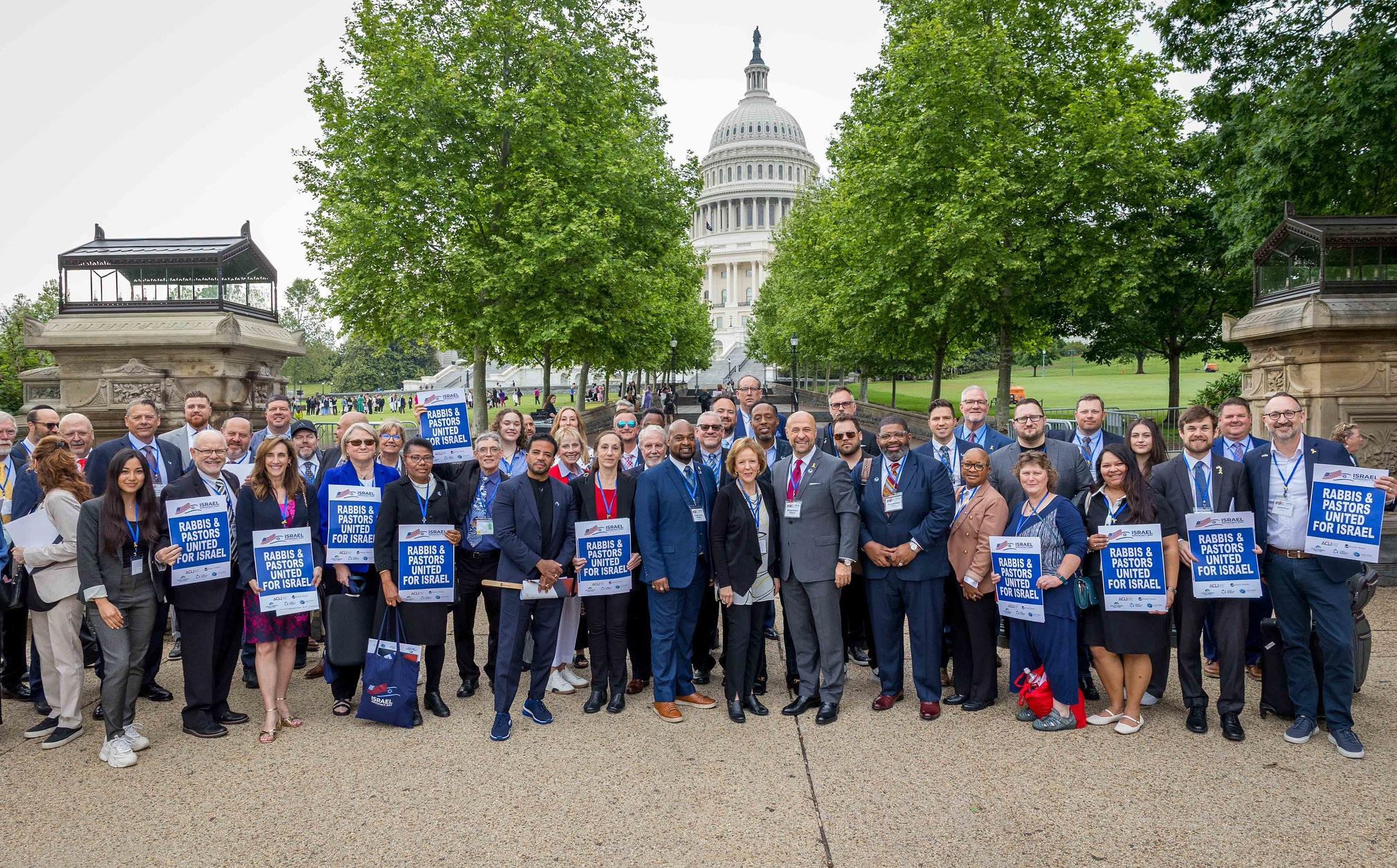
BY SHELLEY NEESE, ACLI COORDINATOR
Inspired by the enduring words of the prophet Isaiah, “Comfort, comfort my people” (40:1), the ICEJ acts on a fundamental principle: to bring a “ministry of comfort” to Israel and the Jewish people. Traditionally, this has meant extending a hand through vital humanitarian aid— supporting the vulnerable survivors of the Holocaust, smoothing the path of Aliyah for families, and providing tangible necessities like bomb shelters and medical equipment. Yet, the brutal events of October 7 cast a stark new light on the needs of the American Jewish community. As a wave of antisemitism washes over urban centers and college campuses, American Jewish voices speak of unprecedented threat and a chilling sense of isolation.
In this pivotal moment, ICEJ has broadened its scope of providing comfort. For the second consecutive year, we have stood shoulder-to-shoulder with our Jewish friends on Capitol Hill.
In a powerful display of solidarity, the first Israel Advocacy Day took place in January 2024, a mere four months after
Hamas’ deadly attacks in southern Israel. Defying a tight two-week planning window, organizers successfully mobilized 70 rabbis, pastors, and faith leaders who held 30 pivotal meetings with congressional offices. This historic initiative marked the first time Jewish and Christian leaders stood together as one voice to advocate for Israel within the halls of Congress. Their resounding message affirmed that protecting Israel and ensuring the safety of Jewish Americans is a core American priority. Rabbi Stuart Weinblatt of the Zionist Rabbinic Coalition expressed the profound impact of this unity, stating, “You have no idea how comforting it is to us to know that we are not alone.”
While the political gains of the inaugural Israel Advocacy Day were significant, the enduring relationships forged and the trust established proved even more profound.
Building upon this strong foundation, the second Israel Advocacy Day demonstrated remarkable growth. With a more extensive six-month planning period and the collaboration of five co-hosting
organizations, this year’s Israel Advocacy event brought together 300 pastors, rabbis, and faith leaders representing 29 states.
The three-day event commenced with a thoughtfully arranged welcome dinner on Monday evening at the Museum of the Bible. The ICEJ’s event planner, Allison Griffin, strategically organized the table seating to foster connections among leaders from the same states or regions. The program featured prominent voices, including House Speaker Mike Johnson.

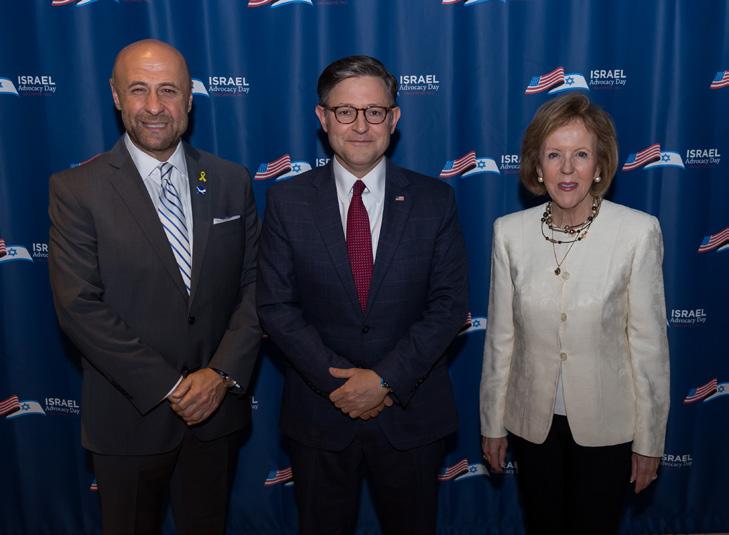
USA, at the Israel Advocacy Day dinner (Photo by: Jonathan Williams | NationalPhotography.us)
The second day saw participants converge on Capitol Hill, where 27 regional groups of 10 conducted over 100 meetings with senators and congressional representatives. A moving encounter occurred when Pennsylvania constituents met with Senator John Fetterman in his office, which was plastered with images of the hostages still held in Gaza. Senator Fetterman’s passionate advocacy for Israel deeply resonated, bringing one rabbi to tears. Another rabbi from Georgia confessed that he often conceals his kippa beneath a baseball cap, and since October 7, he and his family have felt profoundly isolated. This gathering, however, rekindled his hope.
Beyond the formal meetings, the shared meals and intensive day on Capitol Hill fostered deep connections among participants. They forged plans for continued collaboration in their home states. Tyson Lambertson, ICEJ’s Outreach Director, recounted a powerful moment when a rabbi in his group declared to the Christians, “We may not know you very well, but we love you.” During the debrief at a congressional reception organized by the Israel Allies Foundation, each spokesperson passionately affirmed the strength and unity of their respective group.
A highlight of the reception was Florida Representative Byron Donalds’ impassioned address. He denounced Hamas’ attack as “horrific barbarity that can never be tolerated.” Grounded in his faith, the born-again Christian emphasized that while prayer is powerful, “faith without works is dead,” urging tangible action. Representative Virginia Foxx also ignited the room, receiving a spontaneous standing
ovation for her resolute leadership and sharp questioning during the Education Committee’s investigation into campus antisemitism. She proclaimed Israel and America as the “two greatest beacons of hope in the world.”
The day concluded with a compelling call to action from Bishop Robert Stearns of Eagles’ Wings. He challenged the assembled pastors to weave their insights of modern Israel into the fabric of their ministry— their sermons, Sunday school lessons, and teaching schedules. He powerfully asserted that equipping Christians against the dangers of antisemitism and the deception of antizionism necessitates a consistent pro-Israel voice from their pulpits.
On the final day of the three-day event, the Combat Antisemitism Movement provided an empowering workshop. The session equipped Christian leaders to recognize the historical presence of antisemitism within the church and to identify dangerous modern antisemitic canards, symbols, and tropes before they spread within their communities.
Susan Michael, President of ICEJ USA and Director of ACLI, shared her own insightful research on the tragic history of Christian antisemitism. She highlighted

from noted author and social critic Os Guinness. He acknowledged the “blackest stain” of Christian mistreatment of Jews throughout history. However, he also stressed the urgent need for Christians to reject Replacement Theology (also called “supersessionism”) and rediscover the genuine biblical connection between their faith and Judaism. This theological shift, he argued, is essential not only for theological accuracy but for the very future of civilization.
When the prophet Isaiah uttered the words “Comfort my people,” he was prophetically assuring God’s people that even through the severest judgment, God’s love and plan for restoration would ultimately prevail. A century after Isaiah prophesied, the Babylonian army attacked Jerusalem in 586 BCE. The destruction of their divinely appointed monarchy, the loss of their ancestral promised land, and the razing of the sacred temple plunged the people of Judah into a state of demoralization. The trauma of displacement and loss fostered a sense of divine abandonment. Only with their miraculous return to the land did they recognize God’s provision and the fulfillment of his promises.
Once again, Israel is desperately seeking a flicker of hope amid the overwhelming darkness of murderous neighbors and a hostile world. The echoes of betrayal, confusion, and trauma that followed Babylon’s siege reverberate anew after October 7, 2023. Alarmingly, pro-Hamas protestors, knowing our itinerary, lay in wait at the Museum of the Bible and outside our Capitol Hill reception. Waving bloodied kaffiyehs and Palestinian flags, they assailed participants with accusations of Zionism as racism and Israel as captor and killer of Gazan children.
the significant shift in Christian attitudes toward Jews and Israel, largely driven by the Reformation, the Holocaust, and the modern State of Israel, which have fostered a more supportive relationship. However, she warned of ongoing vulnerabilities such as biblical illiteracy and contemporary political and theological movements that foster antisemitic attitudes. Susan urged Christians to actively oppose these dangers.
The gathering concluded with insights
While Christians deeply empathize with Israel’s pain and sense of betrayal, our faith also resonates with the psalmist’s assurance that “the Lord is close to the brokenhearted and saves those who are crushed in spirit” (Psalm 34:18). Our hope and prayer are that even within the often-imposing halls of Congress, where political maneuvering and power dynamics can seem paramount, Christians successfully offered comfort to their Jewish neighbors. Even within “the swamp,” we believe the spirit of the Lord drew near to us all.
The ICEJ USA is excited to introduce the Pastoral Education Fund—a powerful initiative designed to bless, equip, and inspire pastors through firsthand encounters with the land of Israel. And we’re on a mission: to send 20 pastors to Israel for the upcoming Envision Pastors & Leaders Tour & Conference, January 26–February 5.
For many pastors, going to Israel is a once-in-a-lifetime journey. Walking where Jesus walked. Worshiping in Jerusalem. Connecting their Bible with the real, physical places within it. These moments don’t just change a pastor—they transform entire churches.
That’s where you come in. We urgently need your help to be able to send 20 pastors to Israel for Envision 2026.
By giving to the Pastoral Education Fund, you’re not simply sponsoring a trip—you’re investing in spiritual leadership, empowering biblical preaching, and strengthening the connection between the church and Israel.
When a pastor visits Israel:
• Their Bible comes alive and is no longer just words, but places, people, and purpose.
• Their preaching deepens, bringing clarity, passion, and firsthand insight to their messages.
• Their vision is reignited for God’s redemptive plan through Israel and the nations.
•Their congregations are stirred to love the Word, support Israel, and actively engage in God’s mission.
Your gift will help us send a pastor to Envision 2026 or another ICEJ-sponsored study tour where they will receive biblical teaching, historical insights, and prophetic updates directly from the land of the Bible. These trips are not vacations—they are strategic investments in the spiritual leadership of our nation.
Will you help us send a pastor to Israel? Whether you’re an individual, church, or business, your contribution—large or small—makes a lasting impact.
Together, let’s equip those who shepherd others—because when a pastor is transformed, so is their church. And when the church stands with Israel, it declares the faithfulness of God to His promises.

“I traveled to Israel to see the biblical sites for the first time many years ago with other pastors and spouses. I had Bible degrees and had been in pastoral ministry for years in the local church, but this experience transformed my life. I would not have been able to afford to go without the help of individuals and my local church. It is hard to put into words what happens when you go ‘home’ to the Holy Land. The Bible goes from black and white to color and your personal life and pastoral ministry becomes more effective. Helping every pastor experience Israel is essential for the future of the church.”
—Dr Jeff Baxter, lead pastor, Mission Hills Church
“My time in Israel profoundly impacted me in a way that years of ministry could not. In just 10 days, the Bible came alive like never before. Walking where Jesus walked, standing on the shores of Galilee, and praying in the garden of Gethsemane brought depth, clarity, and conviction to the Scriptures I’ve taught for years. For pastors and Christian leaders, experiencing the Holy Land is more than a trip— it’s a transformative encounter. It deepens your preaching, strengthens your faith, and brings the Bible from black-andwhite into full color. I truly believe every pastor needs to go— not just for their own soul but for the people they shepherd.”
—Vaughn Fahrenbruk, The Rock NP
“As a dear friend put it. ‘I came to Israel as a tourist. I left as a pilgrim.’ Experiencing holy Scripture in the land where it was written has transformed my preaching! The land itself and the Jewish people are completely intertwined in the message the Word of God has for us today!”
—Tim Hebbert, lead pastor, Gering Zion Church
Help send a pastor to Israel—and transform generations to come!
www.icejusa.org/pastoral-education-fund


BY ICEJ USA STAFF
On Wednesday, May 21, 2025, Yaron Lischinsky, 30, and Sarah Milgrim, 26—two young Israeli diplomats devoted to their country—were brutally gunned down outside an American Jewish Committee (AJC) event at the Capital Jewish Museum in Washington, DC. The senseless act of hatred was made even more tragic by the fact that the couple had planned to travel to Jerusalem the following week to become engaged.
The global ICEJ team was deeply shocked and saddened by their murder, immediately extending condolences to the Israeli Embassy and the grieving families. ICEJ President Dr. Juergen Buehler, who personally knew Yaron and his family through their shared congregation in Jerusalem, expressed profound sorrow.
“Like my own family, Yaron moved to Israel from Germany out of a deep conviction that he belonged in this nation,” Buehler said. “Several members of our Jerusalem staff also knew him well. His death is a loss for the entire nation of Israel.
“We are heartbroken for the Lischinsky and Milgrim families,” he continued. “May they be comforted and consoled in Zion” (Isaiah 61:2–3).
Sarah, a US citizen from Kansas, served in the Israeli Embassy’s Department of Public Diplomacy. Those who knew her described her as a radiant presence—kind, compassionate, and wholehearted in everything she pursued. She had a deep love for Israel and a sincere respect for all who call the Middle East home.
Yaron, an Israeli citizen and IDF veteran, worked in the Embassy’s Political Department. He had long aspired to a career in politics and
international relations and was a passionate advocate for interfaith dialogue and cross-cultural understanding.
Together, Sarah and Yaron embodied a shared commitment to peace, service, and building bridges between people, nations, and faith traditions.
Authorities have called it a targeted act of violence, the kind of fanatical hatred bred by the rampant wave of antisemitism currently manifesting against Israel and the Jewish people worldwide. The alleged gunman, Elias Rodriquez, reportedly shouted “Free, free Palestine” as he was arrested, further evidence of the increasingly dangerous climate of antisemitic incitement in the United States.
“Our prayers are with the families of Yaron and Sarah, and with the entire Israeli diplomatic community,” said ICEJ USA President Dr. Susan Michael. “I had met Yaron at the ICEJ USA Gala in honor of Israel’s 75th anniversary two years ago. That his life—and Sarah’s— was so senselessly cut short here in our nation’s capital is beyond heartbreaking,” Susan said. “I have worked with the embassy for over 40 years, and never have I witnessed such brazen hatred against the Jewish people.
“This is not an isolated tragedy—it is part of a dangerous wave of antisemitism that is spreading rapidly and must be confronted with courage and moral clarity.”
The loss of these two young Jewish people is a clarion call for Christians everywhere to stand up as never before against the antisemitic incitement now permeating our global discourse.


BY NATIVIA SAMUELSON, ICEJ AID ADMINISTRATOR
As the war in Gaza triggered by Hamas on October 7 unfolded, a second front quickly ignited in Israel’s north as Hezbollah joined the fray in support of its fellow Iranianbacked terror militia. Just as quickly, the ICEJ began supporting urgent aid relief projects on both fronts.
With escalating rocket fire and clashes along the Lebanese border, more than 60,000 Israeli residents in 43 communities along the northern border were ordered to evacuate. Families rushed to pack their lives into suitcases and boxes and drive off. Schools shut down overnight. Small villages that were once lively suddenly became ghost towns.
Eighteen months later, only one in four evacuees has returned. The rest are still displaced, living in hotels or temporary housing options, waiting for a sign that it will be safe to go home.
Throughout 2024, the ICEJ began laying the groundwork for their return to the north, starting with civil preparedness. By strategically placing bomb shelters in these northern communities, we have provided immediate safety and longterm reassurance. The ICEJ installed 30 protective shelters last year alone, including 14 compact cube shelters, eight large shelters, and eight renovations of existing ones across vulnerable communities. Each is strategically positioned just meters from schools, clinics, playgrounds, and homes where split-second access to shelters saves lives.
Each shelter is placed in close coordination with local civilian security officials, focusing on communities where residents have limited time, often just 15 seconds or less, to find safety during an alert. In many towns near the border, sirens signal the need to seek shelter almost immediately.
“This is about providing safety and peace of mind,” said Nicole Yoder, ICEJ’s Vice President for AID and Aliyah. “We’re not only protecting lives, but we’re also helping people remain in or return to their communities.
“We have witnessed how every bomb shelter we have placed or renovated, and every delivery of aid, is a sign that someone sees
them and is helping to prepare them to return, even if the future is still uncertain.”
One of the clearest indicators of this need comes from parents, who often share that access to shelters in schools is a top priority when considering the return home. In response, ICEJ has focused on installing shelters in schools and child therapy centers in both the north and south.
In a recent placement in the Merom HaGalil regional council area in the north, the ICEJ installed a shelter at an elementary school. When the delivery team arrived, they were shocked to learn that this would be the only shelter available where hundreds of children are dropped off and picked up from school every day. “We should install at least another three to four shelters here!” said the delivery driver in disbelief at the security gap these children face.
This underscores how pressing the need for more bomb shelters is to improve civil preparedness in the border region. A second shelter was placed in a nearby field school known for its unique curriculum centered on nature, the environment, wildlife, and conservation.
While government efforts to rebuild and return are underway, the timeline could be long. The Home Front Command estimates that it will take two years to secure the 300 schools near the border. The ICEJ shelters are bridging that gap, allowing kindergartens and schools to reopen, thus enabling residents to resume daily life. These shelters also give displaced families a clear sign of progress.
T he ICEJ plans to continue its work in the north throughout 2025, assisting frontline communities to strengthen their preparedness and create the conditions necessary for a safe return. Your support can help put the next bomb shelter in place and bring safety and peace of mind to more families, schools, and frontline communities.
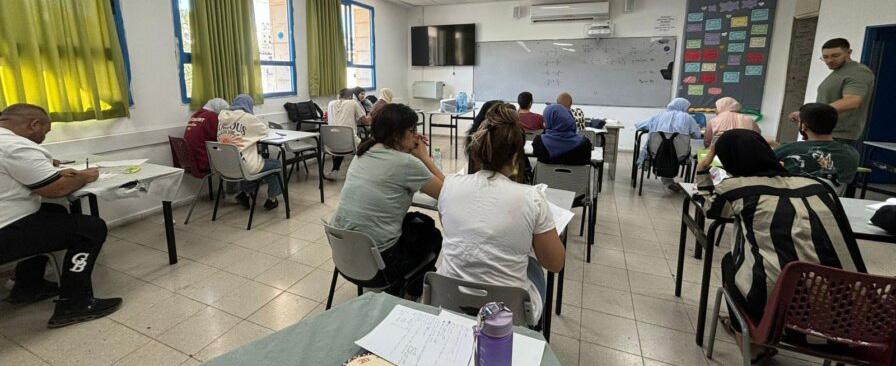
BY NATIVIA SAMUELSON, ICEJ AID ADMINISTRATOR
srael has been caught in a bitter conflict for nearly 18 months now, but hope is on the horizon.
Amid the ongoing war in Gaza and other fronts, many young Israeli adults are struggling and need extra guidance and assistance as they consider their futures in uncertain times. To help this particular group of troubled Israelis, the International Christian Embassy Jerusalem (ICEJ) is sponsoring the “Horizons” program, designed to increase the number of young adults from underprivileged sectors who can obtain a higher education. Whether through vocational studies or academic programs, this multifaceted initiative helps more young people complete more advanced university degrees. In essence, Horizons provides guidance and a safety net during and after secondary school for students who aspire to go further in their education.
Thanks to ICEJ’s partnership and support, Horizons has already made significant strides in expanding opportunities for hundreds of Israeli young adults.
So far over 1,500 at-risk young adults across 25 local municipalities in northern and southern Israel have benefited from the program. With a successful pilot behind them, Horizons was handed over to the Ministry of Welfare and Social Affairs in December 2023, allowing the program to expand across the country, including to central Israel. In January 2024 alone, Horizons was serving 810 students and 560 professionals.
Recognizing the urgent need to bridge the educational gap for Israeli Arab young adults, a specialized track was added in 2024. With 46 percent of 18-year-old Arab men and 43 percent of Arab women in Israel not meeting higher education requirements, the program focuses on enhancing their access to post-secondary education.
Despite wartime challenges and staff shortages, the students in the program are making significant strides forward. A campaign to raise awareness among young adults and their families garnered 200 new inquiries, and orientation sessions were held for professionals working with Israeli Arab youth, including high school principals and probation officers. The program also recently enrolled 31 new students in the Arab towns of Shfar’am and Baqa al-Gharbiyye, offering classes three times a week despite the need for many participants to also work to support their families.
Rana, a young lady from an Arab family on welfare in Be’ersheva, is just one young Israeli who found success through Horizons. At age 19, she sought help in planning her future and finding a good job. Rana was hired by a local clothing store, and after saving enough money, she opened a small business. In parallel, she applied to Kaye Academic College to study education, yet her poor Hebrew skills held her back. Undeterred, Rana and her Horizons’ counselor devised a Hebrew study program that included listening to videos, reading, and speaking. Today, Rana is a confident elementary school teacher who loves her job.
As part of an Israeli government program aimed at reducing economic disparities in the Arab sector by 2026, Horizons plans to expand its community outreach further. By sponsoring dedicated advisors to guide young adults, the ICEJ is making a lasting difference in the educational and vocational futures of young Israelis.
On behalf of these remarkable young people, we extend our heartfelt thanks to those who have supported this initiative and others like it. Your generosity is helping lift many out of poverty and despair, equipping them with the education, skills, and confidence they need to build a better life—especially in these challenging times.
BY MARELINKE VAN DER RIET ICEJ PUBLICATIONS ASSISTANT
In the heart of Tel Aviv, hidden from the public eye, exists a women’s outreach center that offers much more than just food and shelter. The Red Carpet Center, supported by the generosity of Christians from around the world, is a sanctuary for some of the most vulnerable women in Israeli society. For over two decades, this center has provided essential services and, more importantly, the love and care these women never receive on the streets. Through its all-inclusive approach, the center helps restore dignity, offering destitute women a chance at a better life. Karen Beattie, an ICEJ supporter from the United Kingdom, recently had the opportunity to visit the Red Carpet Center and witness firsthand the incredible attention and care that is given to the women who come through its doors.
“When we arrived at the center, we were met with a warm welcome by Anat and her team of volunteers,” recalled Karen. “Anat has run this center for 21 years and still manages to smile and encourage all those who visit. The center has a small salon for hair, feet, and nails, a rest area, showers, and a dining area. At present, it is open two days a week, and there are plans in place to open another center in Haifa.”
On the day of Karen’s visit, around 20 women came to the center for various services, including food, clothing, showers, hair washes, and pedicures. Karen observed firsthand the loving care these women received.
“The ladies were treated with so much love and respect, which they do not receive on the streets,” she said. “It was heartbreaking

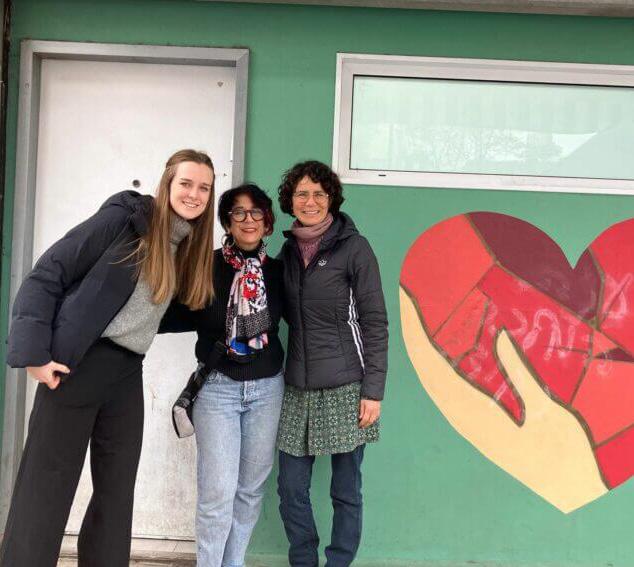
to see what a life of drugs, prostitution, trafficking, and abuse has done to these women. The Red Carpet Center helps restore a degree of dignity to their lives.”
The rapport that Anat and her team have built over the years with these women are truly remarkable. “This relationship and trust have taken many years to establish, but you cannot help but feel the love that the entire team has for these broken women,” Karen reflected. “This is a part of Israel that is ‘unseen.’ The poverty and degradation are such a contrast to Jerusalem and [these women] need our support and prayers,” added Karen.
Jannie Tolhoek, with the ICEJ AID team in Jerusalem, accompanied Karen on her visit and explained the importance of seeing firsthand the power of this initiative.
“Having the opportunity to host Karen and witness her experience at the Red Carpet center was a powerful reminder of the real-world impact of our donors’ generosity,” explained Jannie. “It is one thing to hear about the work being done, but seeing it firsthand, with the women whose lives are being impacted, makes all the difference. The love, dignity, and hope being restored here are a direct result of the support we receive from Christians around the world. This is where the heart of our mission truly meets the reality of change.”
Through the generosity of donors and dedicated volunteers, the Red Carpet Center brings light into one of Israel’s darkest corners, offering hope and restoring lives. Your continued support can make an even greater impact, helping to bring hope to those in desperate need of a hand up in life.

In the heart of Israel, amid the uncertainty of the surrounding conflict, the International Christian Embassy Jerusalem (ICEJ) continues to support social aid projects that look beyond the war toward building a better future for all the people of Israel. One such project seeks to ensure all Israel benefits from its renowned status as the “Start-Up Nation” by bridging the technological divide that threatens to leave behind the country’s most vulnerable sectors.
Even though Israel ranked number 10 globally in the 2023 Global Innovation Index, a significant portion of Israeli society remains disconnected from the flurry of innovation. Astonishingly, 25 percent of Israelis are technologically illiterate due to cultural and financial barriers. A staggering 375,000 children in Israel do not have access to a computer at home, with the lack most prevalent among the poorest Jewish and Arab families. Thus, the Christian Embassy is sponsoring a program that aims to close this social gap by making hi-tech skills more accessible to all, regardless of background or circumstances.
The program at the Ramot Social Computer Lab focuses on providing computer and technology training to Jewish and Arab children and youths at risk, job seekers, people with disabilities, and the elderly. The hope is to empower these individuals and offer educational and professional opportunities that foster social mobility and integration.
The initiative involves recycling and refurbishing computers, which are then distributed to disadvantaged families, thereby opening doors to the digital world for those who have been left behind.
The COVID-19 pandemic that began five years ago highlighted the urgent need for improved technological tools and skills in both the workplace and educational settings. For many, the lack of computers at home and lack of experience with computers at school meant falling further behind in classes or losing access to essential online services. The demand for computers skyrocketed, and the waiting lists grew longer as families struggled to keep up with the new digital demands.
BY NATIVIA SAMUELSON ICEJ AID ADMINISTRATOR
In response, efforts intensified to refurbish and distribute older computers to those in need. Volunteers, including youths at risk and disabled national service members, have played a crucial role in this process. Many have gained valuable skills in PC repair while also helping to supply more computers for children and families in need.
Despite the ongoing conflict in Israel, the ICEJ has remained steadfast in its support of this vital project. The war has undoubtedly added to the challenges faced by vulnerable populations, but it also has underscored the importance of continuing our efforts to close the social gaps here. Providing access to technology is not only about giving people the tools they need to succeed but also about building confidence and giving them a sense of belonging in a time of great uncertainty.
The impact of this project is best captured in the words of a grateful mother whose family received a refurbished computer:
“In these difficult days that the world and each one of us are individually facing, it is not to be taken for granted that there are those who would gather themselves and their resources together despite personal challenges to help others. I want to thank everyone who so generously donated to us. It was a big help. You came to our aid and really saved us. We are certain that there are many other families in our situation, and they are also deeply grateful for this help. Thank you to everyone who made this donation possible.”
“You came to our aid and really saved us.”
Through projects like this, the Christian Embassy continues to support Israelis in need, offering them the tools and opportunities to build a brighter future. With your help, our “Future and a Hope” fund can continue to bridge the remaining social divides and contribute to a more prosperous Israel.

By Dr. Susan Michael, ICEJ USA President
Antisemitism is not only a threat to the Jewish people—it poses a grave danger to the church as well. While many Christians active in supporting Israel may not fully realize it, we are living in a pivotal moment in history. The progress in Jewish-Christian relations today marks a monumental shift—one that is deeply significant but should not be taken for granted.
Sadly, for centuries, Christian theology played a role in fostering widespread hostility toward Jews. This deep-rooted enmity embedded in European Christian history gave rise to discrimination, expulsions, and even violence against Jewish communities. Unfortunately, many Christians today are unaware of this troubling legacy—and without this understanding, they cannot fully grasp the miraculous healing unfolding in this hour.
Antisemitism, however, is not merely a relic of the past—it persists in new forms. Like a virus, it mutates to fit the ideologies of each new generation. At its core, antisemitism is a spiritual attack on God’s covenant people. As Psalm 83 says, those who hate God seek to “cut them [Israel] off from being a nation,” aiming to erase the name of Israel from memory. The church must recognize this as a spiritual battle and respond accordingly.
A significant transformation occurred 500 years ago with the translation of the Bible into common languages and the advent of the printing press. For the first time, ordinary Christians could read Scripture and discover the Jewish roots of their faith.
They learned that Jesus was Jewish, that Christianity emerged from Judaism, and that God’s promises to Israel were still in effect.
This newfound biblical literacy inspired Christian leaders such as John and Charles Wesley and Charles Spurgeon to support the Jewish return to their ancestral land—a belief rooted not in politics but in justice and prophecy. These men, today recognized as Christian Zionists, saw in Scripture a future restoration of the Jewish people to their land.
Two additional events further shifted the church’s posture toward the Jewish people: the Holocaust and the establishment of the State of Israel. The Holocaust forced Catholic and Protestant denominations alike to reevaluate their theology and renounce antisemitism. And when Israel was declared a state in 1948, many Evangelical Christians viewed it as prophecy fulfilled and began engaging with the Jewish people firsthand. These experiences deepened the church’s understanding and appreciation of its Jewish roots.
While the church has made great progress, antisemitism is resurging—this time in more subtle forms. Political antisemitism— often called anti-Zionism—targets the collective identity of the Jewish people through the State of Israel. Though not all criticism of Israeli policy is antisemitic, the line is crossed when such criticism denies Israel’s right to exist, uses antisemitic rhetoric, or applies double standards not expected of other nations.
This demonization of the Jewish State
inevitably leads to attacks on Jews around the world. When Israeli military actions prompt assaults on Jewish individuals in other countries, the connection is clear: this is not political disagreement—it is antisemitism.
Several trends within Christianity today leave the church vulnerable to antisemitism:
1. Replacement Theology
This doctrine claims that the church has replaced Israel in God’s redemptive plan. Though often reframed today as “fulfillment theology,” the core idea remains the same: God’s covenants with Israel are void. This belief laid the theological groundwork for centuries of Christian antisemitism and persists as a spiritual threat to Christian understanding today.
2. Biblical Illiteracy
As fewer believers engage deeply with Scripture, they become susceptible to distorted teachings. Some contemporary Christian voices have even dismissed the Old Testament as confusing or irrelevant. In reality, it is the removal of Israel from the biblical narrative that causes confusion. When the Jewish people and their covenants are restored to their rightful place in Scripture, the Bible becomes cohesive and alive.
3. Radical Dominion Theology
A growing segment of the Christian right envisions the establishment of a Christian-led global order. Often called “Christ is King” theology, it is not
just about expanding the influence of the kingdom of God in our daily lives but teaches that Jesus will not return until a Christ-centered kingdom has taken dominion on the earth. Jews are blamed for having prohibited the establishment of this kingdom thus far, and, therefore, this ideology is often fueled by conspiracy theories and dangerous antisemitic tropes.
4. The “Christ-Killer” Trope
The accusation that all generations of Jews are collectively responsible for Jesus’ death led to Good Friday being one of the most dangerous days of the year for Jews. Though many churches have reformed their Good Friday liturgy and theology, the “Christ-killer” accusation continues to circulate online and in some conservative discourse. This trope is not rooted in biblical truth but in a dangerous distortion of history.
The International Holocaust Remembrance Alliance (IHRA) has recognized this as a form of antisemitism, including it among their working examples. Misunderstandings about this definition have led some to claim it censors Scripture, but this is not the case. IHRA refers to the baseless accusation that Jews today bear responsibility for Jesus’ death, not the biblical record of the crucifixion.
A Spiritual Battle for the Church
Antisemitism not only threatens the Jewish people—it aims to sever Christians from their own spiritual roots. As the apostle Paul wrote in Romans 11, the Jewish people are the root that supports the church, and to be cut off from that root is to suffer spiritual death. This is why antisemitism must be recognized as an urgent threat within the church. It robs believers of the foundation of their faith and seeks to disconnect them from the very people who are proof of God’s faithfulness. Churches must be vigilant, biblically grounded, and proactive in resisting this evil ideology.
A Call to Stand
The battle against antisemitism is not only for the sake of the Jewish people—it is for the health and future of the church. We must educate our congregations to rightly discern the Word of God, defend truth, and boldly stand with the people of Israel. In doing so, we align ourselves with God’s purposes and promises, both past and present.




